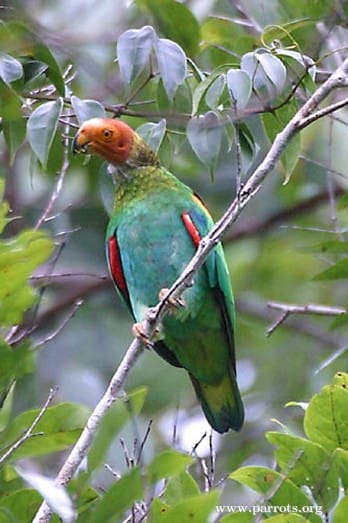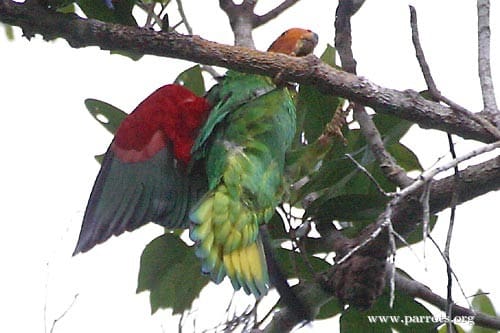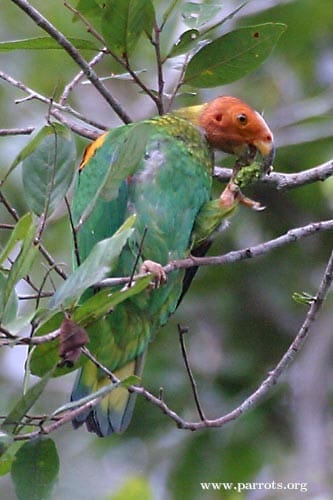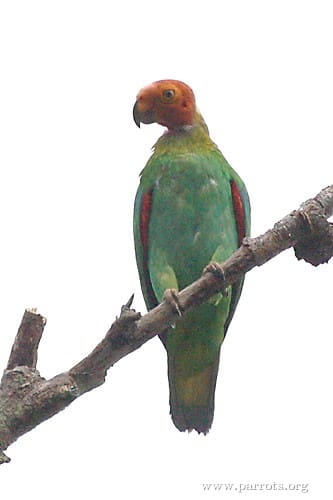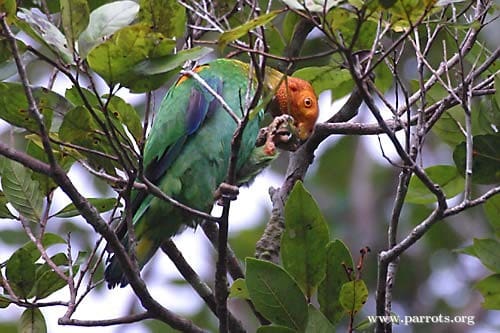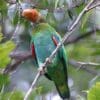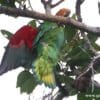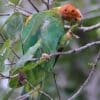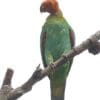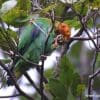Orange-headed Parrot
Also known as:
Bald Parrot, Orange-headed Bald Parrot
Also known as:
Bald Parrot, Orange-headed Bald Parrot
DID YOU KNOW?
Orange-headed, Pesquet’s and Vulturine Parrots are the only three species of parrot with bald heads.

Pyrilia

aurantiocephala
Size:
23 cm (9 in)
Weight:
Not recorded.
Subspecies including nominate:
one
Colour Adult:
Both adults in general yellow/green; orange head bare; green/yellow hindneck; orange/yellow bend of wing and scapulars; red carpal edge and underwing coverts; dull olive/yellow upper breast; yellow thighs. Beak dark grey with orange at base of upper mandible. Eye orange.
Colour Juvenile:
Orange, bare lores to area around eyes, the rest of head feathered and dull green; yellow/green upper breast. Beak yellow in very young birds.
More Information:
Content Sources:
CITES
BirdLife International
Cornell Lab of Ornithology/Birds of the World
A Guide to Parrots of the World, Juniper and Parr, 1998
Parrots of the World, Forshaw, 2006. 2010 edition
Lexicon of Parrots, Thomas Arndt.
Captive Status:
Not found in aviculture.
Longevity:
—
Housing:
—
Diet:
—
Enrichment:
—
Nest Box Size:
—
Clutch Size:
Not recorded.
Fledging Age:
—
Hatch Weight:
—
Peak Weight:
—
Weaning Weight:
—
World Population:
6700 mature individuals, decreasing.
IUCN Red List Status:
Near Threatened
CITES Listing:
Appendix II
Threat Summary:
Not globally threatened. Found in only a few localities encompassing lower Rio Madeira, upper Rio Tapajós and Rio Teles Pires. The range where this parrot is found is economically managed through environmental tourism, but surrounding areas are under constant threat from logging. Over the past 12.3 years, 4% of tree cover has been lost within its range; however, since 2016 tree cover loss has been accelerating to a rate equivalent to 6% over three generations. Population declines are unlikely to exceed 10% over three generations.
Range:
E Amazonas and W Para, N Brazil.
Habitat:
Found up to 300 m (984 ft) in lowland gallery forest bordering waterways, particularly mixed forest on white sand soils.
Wild Diet:
Feeds on seeds, fruits and possibly wasp larvae from galls.
Ecology and Behaviour:
Seen singly, in pairs or in small flocks of up to 10 birds. Active earlier in the morning than other parrots, and goes to roost earlier. Keeps to upper canopy where well camouflaged.
Clutch and Egg Size:
Not recorded.
Breeding Season:
Possibly September.
Related Links:
—
